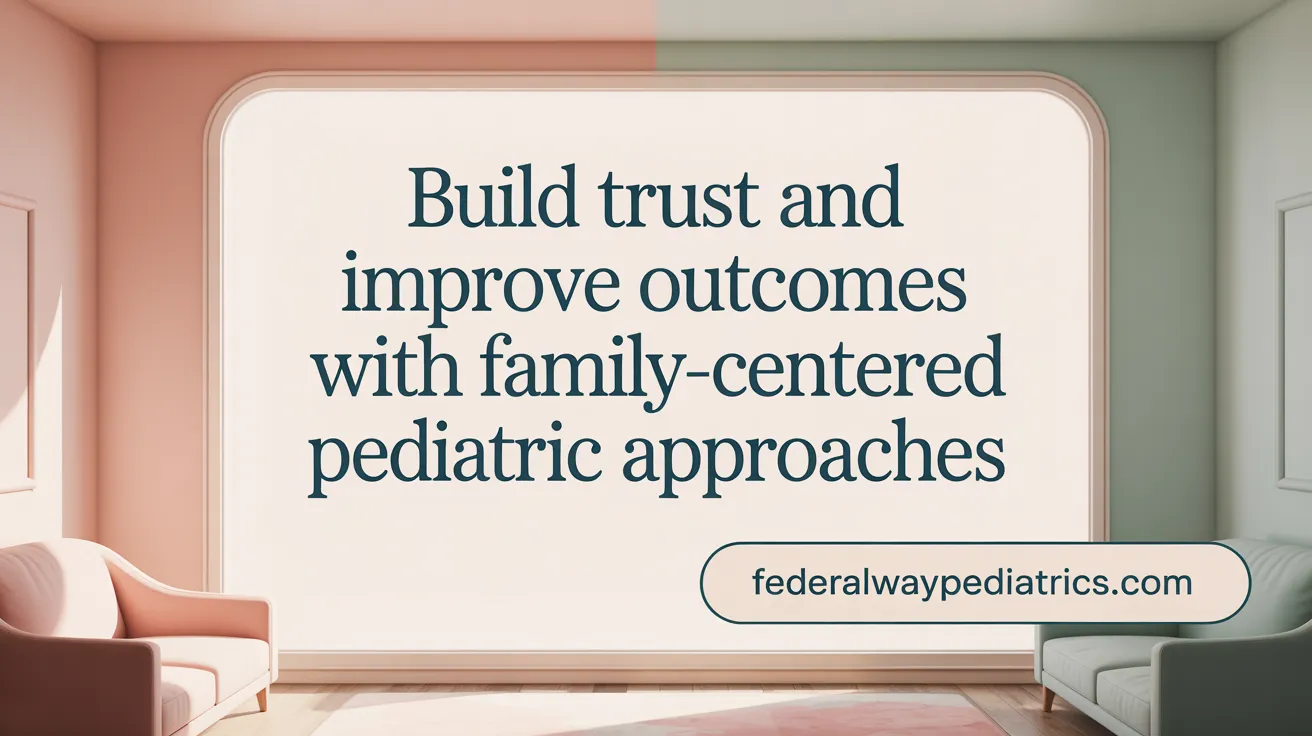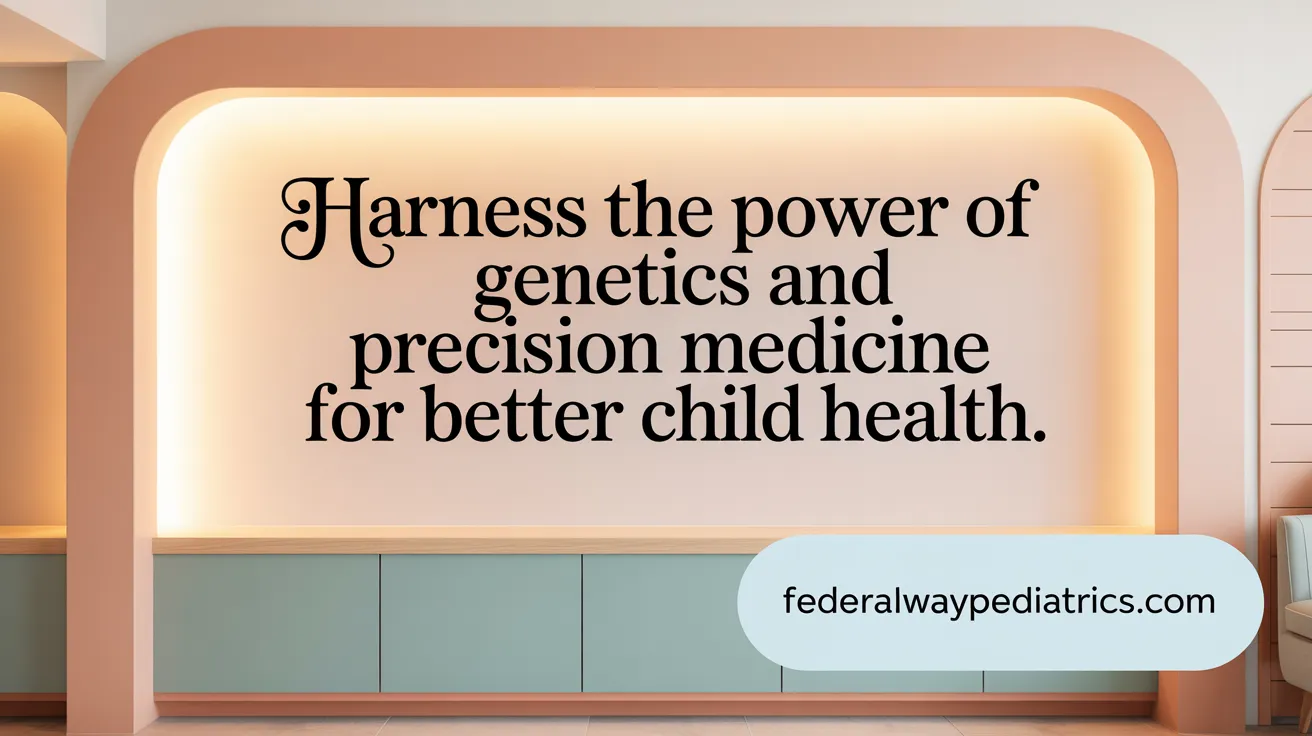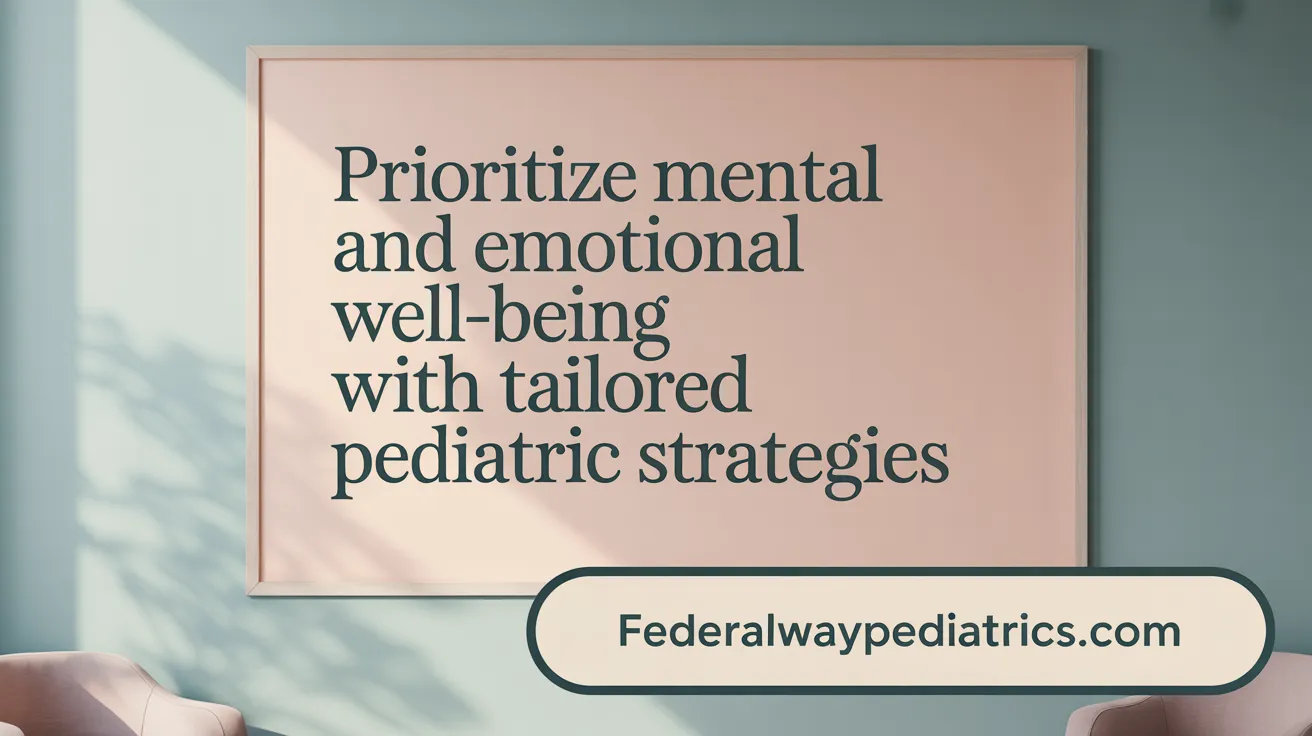Personalized Pediatric Care: Transforming Child Health Outcomes
Personalized pediatric healthcare represents a revolutionary approach that customizes medical care to the unique needs of each child, taking into account their medical history, genetics, lifestyle, and family environment. This strategy enhances early detection, prevention, and management of health conditions, improves patient and family engagement, and fosters long-term well-being. As pediatric medicine evolves with advancing technology and a deeper understanding of biological and social determinants of health, personalized care stands at the forefront of improving child health outcomes across diverse populations.
Foundations of Personalized Pediatric Care: Tailoring Health to the Individual Child

What is personalized pediatric care and why is it important?
Personalized pediatric care focuses on tailoring medical attention to the unique needs of each child. This approach considers the child's health history, lifestyle, family values, and environmental context to deliver the most appropriate and effective healthcare. Building a strong pediatrician-family relationship is central to personalized care, as it promotes trust, open communication, and a deep understanding of each child's health journey. This bond enables early detection of health concerns, allowing interventions before small issues escalate.
How does personalized care support preventive services?
Personalized care enhances preventive health by customizing vaccination schedules and wellness plans to fit the individual child. Pediatricians adjust immunizations and screening protocols based on a child's specific risk factors, health conditions, and exposures. This individualized planning offers better protection against diseases and supports timely monitoring of developmental milestones and overall well-being. See more on Personalized Pediatric Care at Home and tailored healthcare.
Why are individualized care plans essential?
Individualized care plans encapsulate the child's unique medical needs, development status, and lifestyle. They enable pediatricians to coordinate treatments, track progress, and make adjustments informed by comprehensive knowledge of the child. These plans promote proactive health management and optimize long-term outcomes. Learn about Individualized Care Plans and Customized Care Plans at Home.
What role does the pediatrician-family relationship play?
The partnership between pediatricians and families forms the foundation of personalized care. Frequent, consistent visits foster comprehensive understanding and trust. Families become active collaborators in health decisions, improving adherence to care plans and fostering a supportive environment for the child’s growth and development. Explore the impact of Pediatrician-family relationships and Family engagement in pediatric care.
How are preventive and vaccination plans tailored?
Preventive care leverages detailed knowledge of the child’s individual health profile to adapt vaccination timing and screenings. Environmental factors, such as geographic risks and family medical history, inform these adjustments, ensuring that preventive measures are both relevant and effective for each child’s situation. For further details, see Personalized vaccination plans and preventive care and Tailored treatment and prevention plans.
Leveraging Genetics and Precision Medicine to Enhance Pediatric Outcomes

How do genetics and precision medicine contribute to personalized pediatric healthcare?
Genetics plays a transformative role in pediatric medicine by enabling personalized pediatric healthcare tailored to each child's unique genetic makeup. Genomic technologies, such as rapid genome and exome sequencing, provide swift and accurate diagnoses for complex pediatric conditions like epilepsy and various rare diseases. These breakthroughs allow clinicians to identify specific genetic causes in up to 50% of cases rapidly, which significantly informs targeted treatment strategies.
Precision medicine incorporates genetic, molecular, and environmental factors to create individualized treatment plans. This approach not only enhances the efficacy of therapies but also reduces adverse effects by considering a child's metabolic and genetic profile. For chronic pediatric conditions and rare diseases, precision medicine guides the use of novel therapies, including gene therapy and small molecule drugs, contributing to improved outcomes.
Advancements in biomarkers and molecular data further refine personalized treatment. Biomarkers serve as objective indicators to diagnose disease, monitor progression, and evaluate responses to therapy. Techniques such as epigenetic assays analyze immune cell populations using minimally invasive samples, enabling early detection and targeted intervention. The integration of these biological data with clinical insights fosters a holistic, precise approach to pediatric care, promising improved long-term health for children.
Enhancing Chronic Condition Management Through Personalized Care
How does personalized pediatric care improve management of chronic conditions?
Personalized pediatric care significantly improves the management of chronic conditions like asthma, diabetes, and allergies by tailoring treatment plans to each child's unique needs. This individualized approach considers important factors such as medication sensitivities, dietary requirements, and psychological support.
Tailored Treatment Plans for Asthma, Diabetes, and Allergies
Each child's condition is different, so personalized care plans adapt medication dosages, types, and schedules based on how the child responds or may react adversely. Dietary adjustments are also customized to reduce flare-ups or manage symptoms effectively, particularly for allergies and diabetes.
Continuous Monitoring and Home-Based Care
Ongoing monitoring, including frequent check-ins and home-based care, plays a crucial role in managing chronic illnesses. Home visits allow healthcare providers to closely observe the child's environment and health in a familiar setting, fostering timely interventions and improved communication with families.
Better Health Outcomes Through Individualized Management
When treatment is fine-tuned and responsive to individual needs, children experience better symptom control, fewer emergency visits, and lower risk of complications. Emotional and behavioral supports in care plans further enhance adherence and overall well-being.
By incorporating personalized adjustments and continuous home support, chronic condition management becomes more effective and child-centered, helping children lead healthier lives.
The Impact of Home-Based and Accessible Pediatric Care on Child Health
What are the benefits of personalized pediatric care provided in the home?
Providing personalized pediatric care at home offers multiple advantages tailored to the child's individual needs. Delivering care in a familiar environment helps reduce anxiety and stress commonly associated with hospital visits.
Frequent home visits foster stronger relationships built on trust and open communication between healthcare providers and families. This deeper connection enables providers to better understand the child's social and emotional surroundings, improving diagnosis and treatment accuracy.
Home-based care also involves family participation, enhancing emotional support and encouraging adherence to treatment plans. It supports not only immediate health needs but also the establishment of healthy habits that can last into adulthood.
How do personalized and accessible care combine to improve health equity?
Personalized pediatric care becomes truly equitable when combined with accessible approaches that overcome common barriers. Transportation difficulties, financial constraints, scheduling challenges, and language differences often prevent many families from obtaining consistent care.
Initiatives such as telemedicine, mobile clinics, community outreach programs, and multilingual services bring care directly to underserved populations. These efforts ensure timely interventions, foster trust between families and healthcare providers, and maintain continuity of care, especially crucial for children managing chronic conditions.
Technology plays a vital role by enabling remote consultations and continuous monitoring, increasing access irrespective of geographic or socio-economic factors. Such integrated models support better health outcomes across diverse communities.
Together, home-based personalized care and accessible healthcare delivery create an inclusive, patient-centered pediatric experience that promotes lifelong well-being for children everywhere.
Supporting Mental and Emotional Health Through Personalized Pediatric Approaches

How does personalized pediatric care address mental and emotional health?
Personalized pediatric care actively integrates mental, emotional, and behavioral health as central components of each child’s overall well-being. This care model includes routine screening for issues such as anxiety, depression, and behavioral challenges to detect early signs and provide timely interventions. Pediatricians tailor mental health support based on the child’s unique medical history, developmental needs, and family context.
Integrating mental, emotional, and behavioral health in pediatric care
Frequent well-child visits enable pediatric providers to assess emotional and behavioral health alongside physical health, helping identify social or psychological concerns early. Interdisciplinary teams—including behavioral health professionals within primary care settings—offer comprehensive support that addresses children’s holistic needs (Strategies for health care settings).
Screening and early intervention for mental health issues
Routine mental health screenings for depression and anxiety in adolescents have become increasingly common, ensuring prompt identification and connection to resources. Early intervention can prevent the escalation of mental health disorders and improve long-term outcomes (Behavioral health screening in pediatric care).
School-based and telepsychiatry programs
Programs located in schools or accessible via telepsychiatry expand mental health care reach, especially for children in underserved or rural areas. These services reduce stigma and allow children to receive care in familiar environments, promoting better engagement and adherence to treatment (Telemedicine in Pediatric Care).
The role of caregivers and family involvement in emotional well-being
Family involvement is crucial in supporting a child's mental health. Personalized care actively engages caregivers in treatment planning, education, and ongoing support, fostering trust, adherence, and resilience within the child’s support system (The value of engaged caregivers).
Quality Improvement and Technology: Advancing Personalized Pediatric Healthcare
How do quality improvement and technology support personalized pediatric healthcare?
Quality improvement (QI) initiatives in pediatric care systematically enhance the safety, effectiveness, timeliness, patient-centeredness, efficiency, and equity of healthcare services. Hospitals and pediatric centers implement QI programs by employing data-driven methods that allow precise monitoring, continuous assessment, and targeted interventions. For example, teams have successfully reduced emergency visits for asthma and improved outpatient epilepsy care through customized action plans and standardized treatment protocols (Quality Improvement in Pediatric Healthcare, 5 Effective Quality Improvement Initiatives for Children's Health.
Technology plays a pivotal role in enabling personalized pediatric healthcare. Telehealth expands access by overcoming geographical and scheduling barriers, allowing families to consult pediatricians virtually and receive timely interventions (Telemedicine in Pediatric Care, Pediatric Care Innovations Shaping the Future of Child Health. Electronic Health Records (EHRs) provide comprehensive, secure sharing of medical data across healthcare teams, improving care coordination and reducing errors (Personalized and Accessible Care in Pediatrics). Wearable devices monitor children’s vital signs and activity levels in real-time, facilitating early detection of health issues and personalized adjustments (Wearable Health Devices for Children. Artificial Intelligence (AI) analyzes large datasets—including symptoms, genetics, and imaging—to assist diagnostics, optimize treatment plans, and predict disease progression (AI in Pediatric Diagnostics, Precision Medicine in Pediatric Healthcare).
Together, QI methodologies and technological innovations improve patient outcomes by promoting equitable access, better care coordination, and enhanced family engagement (Accelerating Child Health Care Transformation, The Value of Engaged Caregivers in Improving Outcomes for Children with Special Health Care Needs. Staff training in QI principles and technology use ensures frontline providers can deliver consistent, personalized care (Quality Improvement Transforming Pediatric Health Care). Data-driven approaches also support predictive analytics and identification of social needs, enabling targeted support and preventive strategies (Pediatric Social Risk Screening and Interventions, Quality Improvement to Address Social Needs.
Through integrating these strategies, pediatric healthcare steadily advances toward a future where each child receives tailored, accessible, and high-quality care that encourages optimal growth and well-being (Personalized Pediatric Care Enhances Your Child's Well-Being, Personalized and Accessible Care in Pediatrics.
Family and Caregiver Engagement: Cornerstones of Successful Personalized Pediatric Care
What role do engaged caregivers play in personalized pediatric care?
Engaged caregivers are essential for the success of personalized pediatric care. Their active involvement leads to improved treatment adherence as they help ensure that children follow prescribed medical plans accurately. Caregiver participation also enhances coordination among healthcare providers, which reduces fragmented care and lowers the frequency of emergency visits.
How do models emphasizing family-centered care support personalized pediatric care?
Family-centered care models emphasize continuous, comprehensive support where caregivers have direct, often 24/7 access to healthcare providers. Programs like Imagine Pediatrics integrate medical, behavioral, and social supports seamlessly, enabling caregivers to collaborate closely with care teams. This partnership fosters trust and strengthens the individualized care plan.
What are the benefits of personalized communication and direct access for families?
Providing caregivers with direct communication methods such as phone, text, or email allows timely responses to health concerns, reduces delays in care, and facilitates early intervention. This accessibility promotes peace of mind, supports the child's emotional well-being, and encourages proactive health management as highlighted in pediatric direct primary care benefits.
How does caregiver engagement impact overall health outcomes and satisfaction?
When caregivers are empowered and engaged, children experience better health results due to consistent monitoring and timely adjustments to care. Additionally, family satisfaction improves because caregivers feel supported and involved in decision-making, reinforcing a positive care experience and long-term wellbeing for the child as detailed in caregiver involvement in treatment adherence.
The Future of Personalized Pediatric Healthcare
Personalized pediatric healthcare, grounded in genetic insights, individualized care plans, and advanced technologies, is transforming how children’s health needs are understood and met. By integrating physical, mental, and social dimensions of health and embracing accessible, home-based care models, this approach addresses health disparities and promotes equity. Engaged families and quality improvement initiatives strengthen the system, ensuring that each child receives care tailored to their unique circumstances. As innovation continues, personalized pediatric care promises to optimize health outcomes, foster resilience, and support lifelong well-being for children everywhere.
